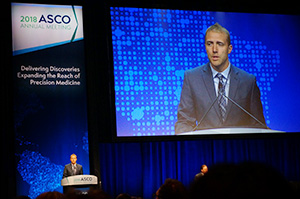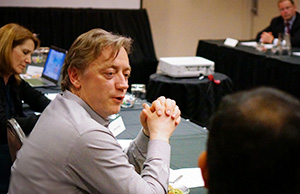Investigators participating in Hoosier Cancer Research Network’s Thoracic Clinical Trial Working Group have named three of their colleagues to serve as co-chairs of the group. The new co-chairs are (pictured from left) Greg Durm, MD, assistant professor of clinical medicine at Indiana University School of Medicine and a researcher at the IU Melvin and Bren Simon Comprehensive Cancer Center; Mary Jo Fidler, MD, associate professor, Department of Internal Medicine at Rush Medical College, Rush University; and Ryan Gentzler, MD, associate professor of medicine: hematology and oncology at the University of Virginia School of Medicine. They succeed former co-chairs Karen L. Reckamp, MD, MS, director of the Division of Medical Oncology at Cedars-Sinai Cancer, and Rachel E. Sanborn, MD, medical oncologist at Providence Cancer Institute. HCRN co-chairs serve two-year terms with the potential to serve additional terms with the support of their colleagues.
HCRN Clinical Trial Working Groups (CTWGs) provide a forum where researchers from member institutions collaborate to discuss and develop study concepts, identify potential co-investigators and sites to participate in studies, and review the progress of ongoing clinical trials. CTWGs provide junior investigators an opportunity to receive scientific feedback and mentorship from their senior peers. The Thoracic CTWTG meets by teleconference every other month.
Dr. Durm’s clinical and research interests include novel approaches to treat lung cancer and cancers of the head and neck, using immunotherapy-based approaches. Dr. Fidler is co-lead of Rush’s thoracic program and her clinical and research interests include lung cancer and cancer cachexia. Dr. Gentzler’s clinical and research interests include developing new drugs and therapeutic strategies for the treatment of lung cancer, including novel combinations to overcome resistance for EGFR-mutant lung cancers, and new therapies for small cell lung cancer.
 “Looking at the portfolio we have in the thoracic group, it’s remarkably well-balanced,” Dr. Fidler said. “We have trials in small cell, mesothelioma, preoperative and definitive stage three cancer, and EGFR open now. I think that speaks to the strength of the network.”
“Looking at the portfolio we have in the thoracic group, it’s remarkably well-balanced,” Dr. Fidler said. “We have trials in small cell, mesothelioma, preoperative and definitive stage three cancer, and EGFR open now. I think that speaks to the strength of the network.”
Dr. Fidler added the working group has a strong record of completed studies, leading to numerous publications.
Dr. Durm said the research coming from the Thoracic CTWG covers the breadth of lung cancer, with novel approaches in key areas of research interest.
“A lot of trials here are very innovative, with new combinations and novel uses for current medications,” Dr. Durm said. “Investigators have an opportunity to immerse themselves in clinical trial development and make a significant impact, including authorship.”
Dr. Durm said he wants to build on the success the group experienced under the leadership of Dr. Sanborn and Dr. Reckamp. He encourages new investigators to join a working group call, provide a one-page outline of their research concept, and be open to feedback from their peers.
Dr. Gentzler hopes junior faculty will engage with more seasoned investigators from other cancer centers within HCRN.
“This is a forum that is ripe for mentorship and having small groups of investigators involved in a trial,” Dr. Gentzler said. “Most trials accrue quickly through our network and we hope to continue to do that in the future.”
 HCRN has CTWGs in a variety of cancer types, including breast cancer, gastrointestinal cancers, genitourinary cancers, melanoma, myeloid malignancies, and thoracic cancers, and a correlative sciences working group. Each group meets via teleconference as well as occasional in-person meetings. The groups include senior and junior investigators in both academic and community settings.
HCRN has CTWGs in a variety of cancer types, including breast cancer, gastrointestinal cancers, genitourinary cancers, melanoma, myeloid malignancies, and thoracic cancers, and a correlative sciences working group. Each group meets via teleconference as well as occasional in-person meetings. The groups include senior and junior investigators in both academic and community settings.
“HCRN has a vast network of academic and community sites that makes it easy to open a multi-site trial without doing all the legwork yourself,” Dr. Gentzler said. “There’s a network of invested researchers who are anxious and willing to open these trials. HCRN manages participating sites and data collection, and makes that a seamless process. There’s potential for authorship that you may not get with other groups.”
Learn more about HCRN’s Clinical Trial Working Groups.
Join a Clinical Trial Working Group.
About Hoosier Cancer Research Network:
Hoosier Cancer Research Network (formerly known as Hoosier Oncology Group) conducts innovative cancer research in collaboration with academic and community physicians and scientists across the United States. The organization provides comprehensive clinical trial management and support, from conception through publication. Created in 1984 as a program of the Walther Cancer Institute, Hoosier Cancer Research Network became an independent nonprofit clinical research organization in 2007. Since its founding, Hoosier Cancer Research Network has conducted more than 210 trials in a variety of cancer types and supportive care, resulting in more than 350 publications. More than 8,500 subjects have participated in Hoosier Cancer Research Network clinical trials.

